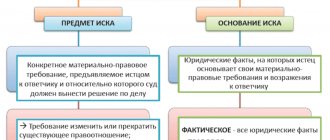Grushina ElenaRealtor with legal education. Work experience - 12 years
Hello. In this article you will learn how to check out of your private apartment, someone else’s, or a municipal one. In principle, it doesn’t matter which apartment you check out from, the procedure is almost the same. I have identified 2 methods of discharge - “to nowhere” and with the help of registration for new housing. This can be done at the passport office, at the MFC and at the State Services.
A small digression - if you need a free consultation, write online to the lawyer on the right or call (24 hours a day, seven days a week for all regions of the Russian Federation) Moscow and the region; 8 (812) 425-62-89 — St. Petersburg and region; all regions of the Russian Federation.
Is it possible to?
The law establishes that the citizen himself must , that is, this is a voluntary matter.
However, the legislation also provides for the forced termination of the right to use housing, or deregistration without his consent .
In most cases, this is done through the courts.
The owner is given the right to register and deregister people in the home he owns.
Therefore, only he can file a lawsuit. But the tenant of municipal housing can also apply as a representative of the owner, i.e. the municipality.
Court is a last resort. It is worth contacting him only when other methods have been exhausted. In addition, there must be good reasons for this.
Discharge a person from an apartment without his consent
Author: Anatoly Antonov, October 15, 2021 at 23:45 Good afternoon!
Deregistration (“extract”) without the consent of a person is possible only if this person does not have a share in the ownership of the apartment. But even in the absence of a share, this is only possible in court if there are the following grounds (clause 31 of the Decree of the Government of the Russian Federation of July 17, 1995 N 713 “On approval of the Rules for registration and deregistration of citizens of the Russian Federation at the place of stay and at the place of residence within Russian Federation": Removal of a citizen from registration at the place of residence is carried out by the registration authorities in the event of: a) change of place of residence - on the basis of a citizen’s application for registration at a new place of residence or an application for deregistration at the place of residence (in writing or in the form of an electronic document). When registering at a new place of residence, if the citizen has not deregistered at his previous place of residence, the registration authority is obliged to send a corresponding notification to the registration authority at the citizen’s previous place of residence within 3 days to remove him from registration;... d) recognition as missing - on the basis of a court decision that has entered into legal force; e) death or declaration of death by a court decision - on the basis of a death certificate issued in the manner prescribed by law; f) eviction from an occupied residential premises or recognition as having lost the right to use residential premises - on the basis of a court decision that has entered into legal force; g) detection of untrue information or documents that served as the basis for registration, as well as unlawful actions of officials when deciding the issue of registration - on the basis of a court decision that has entered into legal force; h) changes by the citizen specified in paragraph 26(1) of these Rules of nomadic routes, as a result of which such routes began to pass beyond the boundaries of the municipal district at the address of the local administration of the settlement of which he is registered at the place of residence - based on the citizen’s written application with the attachment of a document confirming that the citizen maintains a nomadic and (or) semi-nomadic lifestyle; ... j) revealing the fact of fictitious registration of a citizen at the place of residence in the residential premises in which this citizen is registered - on the basis of a decision of the registration authority in the manner established by the Ministry of Internal Affairs of the Russian Federation. According to Article 31 of the Housing Code, family members of the owner of a residential premises include his spouse living together with this owner in the residential premises belonging to him, as well as the children and parents of this owner. Other relatives, disabled dependents and, in exceptional cases, other citizens may be recognized as members of the owner’s family if they are settled by the owner as members of his family. Family members of the owner of a residential premises have the right to use this residential premises on an equal basis with its owner, unless otherwise established by an agreement between the owner and members of his family. Family members of the owner of a residential premises are obliged to use this residential premises for its intended purpose and ensure its safety. Members of the family of the owner of a residential premises who are capable and limited by the court in their legal capacity are jointly and severally liable with the owner for the obligations arising from the use of this residential premises, unless otherwise established by agreement between the owner and members of his family. In the event of termination of family relations with the owner of a residential premises, the right to use this residential premises for a former family member of the owner of this residential premises is not retained, unless otherwise established by an agreement between the owner and the former member of his family. If a former family member of the owner of a residential premises has no grounds for acquiring or exercising the right to use another residential premises, and also if the property status of a former family member of the owner of a residential premises and other noteworthy circumstances do not allow him to provide himself with another residential premises, the right to use the residential premises owned by the specified owner may be retained by a former member of his family for a certain period based on a court decision. In this case, the court has the right to oblige the owner of the residential premises to provide other residential premises for the ex-spouse and other members of his family, in whose favor the owner fulfills alimony obligations, at their request. Upon expiration of the period of use of residential premises established by a court decision taken taking into account the provisions of Part 4 of this article, the corresponding right to use the residential premises of a former family member of the owner is terminated, unless otherwise established by agreement between the owner and this former member of his family. Before the expiration of the specified period, the right to use the residential premises of a former family member of the owner is terminated simultaneously with the termination of the ownership right to this residential premises of this owner or, if the circumstances that served as the basis for maintaining such a right have ceased, on the basis of a court decision. A former family member of the owner who uses residential premises on the basis of a court decision made taking into account the provisions of part 4 of this article has the rights, bears the duties and responsibilities provided for in parts 2 - 4 of this article. A citizen who uses residential premises on the basis of an agreement with the owner of this premises has rights, bears duties and responsibilities in accordance with the terms of such agreement. According to Articles 34 and 36 of the Family Code, to property acquired by spouses during marriage (common property of spouses) , include the income of each spouse from work, entrepreneurial activity and the results of intellectual activity, pensions, benefits received by them, as well as other monetary payments that do not have a special purpose (amounts of financial assistance, amounts paid in compensation for damage due to loss of ability to work due to injury or other damage to health, and others). The common property of the spouses also includes movable and immovable things acquired at the expense of the spouses' common income, securities, shares, deposits, shares in capital contributed to credit institutions or other commercial organizations, and any other property acquired by the spouses during the marriage, regardless of whether in the name of which of the spouses it was purchased or in the name of which or which of the spouses contributed funds. The right to the common property of the spouses also belongs to the spouse who, during the marriage, managed the household, cared for children, or for other valid reasons did not have independent income. Property that belonged to each of the spouses before marriage, as well as property received by one of the spouses during marriage as a gift, by inheritance or through other gratuitous transactions (the property of each spouse), is his property. Personal items (clothing, shoes and others), with the exception of jewelry and other luxury items, although acquired during the marriage at the expense of the spouses’ common funds, are recognized as the property of the spouse who used them. The exclusive right to the result of intellectual activity created by one of the spouses belongs to the author of such result. Thus, the answer to your question depends on whether the jointly acquired property was distributed. If it was not carried out, then regardless of who is the owner of the property according to the documents, the property is still in common joint ownership, and your ex-husband also has a share in the ownership of the apartment. Therefore, it is impossible to deregister him without his consent. If, after the division of jointly acquired property, the apartment turns out to be your property, then deregistration of a person is possible, but only through a judicial procedure. To do this, you need to submit an application to the district court at the location of the apartment to remove the citizen from registration. You need to submit the court decision that has entered into legal force, along with other documents, to the department of the Federal Migration Service of the Ministry of Internal Affairs (“passport office”) at the location of the apartment. Answer
Reasons
How to discharge a citizen in court? Let's consider the grounds for discharge without the consent of the discharged persons.
There are common grounds for appealing to the courts for privatized housing and for municipal ones.
How to eject a non-owner from an apartment without consent? The owner himself can only register the person who registered after the privatization of the housing .
People who lived in the apartment before privatization can only be discharged by the court. And from a municipal housing without the consent of a person, it is possible to cancel its registration only through a court decision. And nothing else.
Now the grounds are common to both forms of ownership:
- The citizen has rent arrears. Non-payment for more than 6 months (read about extracting from an apartment with debts).
- The person does not live in the home where he is registered for a long time.
- He has another apartment. That's where he lives.
- Uses the home for other purposes.
- They caused damage to the apartment.
- Unsanitary conditions. Does not follow hygiene rules.
- Hostile relationships.
- The tenant interferes with the lives of those around him. Is a bully or otherwise violates the rights of other residents.
- The contractual relationship (rent, hire, etc.) has ended.
- The citizen was registered in violation of registration rules.
- The house is in disrepair, dilapidated, and is subject to demolition.
Also find out on our website whether it is possible to discharge a convicted person, how to discharge a relative, and whether it is necessary to discharge a deceased person from an apartment.
Questions and answers
Will they accept my documents for my new place of residence without Form 7?
Yes, they will. Previously, without this document, you could have been denied registration. But now the Regulations have been changed in your favor: documents are accepted, but the request is sent to your previous place of residence. The employee will provide you with a written explanation.
What if I lost both my departure slip and my passport?
In this case, a duplicate will not be issued. You need to apply for a new passport.
They don't register me. What should I do?
Contact the prosecutor's office.
Causes
For legal proceedings and subsequent forced eviction, the reason may be, for example:
- divorce (read about deprivation of registration of an ex-husband and ex-wife);
- family relationships ended. For example, parents do not want to live with adult children;
- lack of common farming. The tenant or tenants do not participate in the maintenance of the apartment.
These same reasons may also serve as grounds for the homeowner to go to court.
You can learn about how to get discharged while in another city, whether it can be done by power of attorney, as well as through State Services or MFC, and what documents are required for discharge from our articles.
With the help of registration in a new place
When the places of both previous and current registration are located in the same city, there is no need to register in advance.
When registering at a new address, you will be automatically discharged from your previous place of registration. The duration of this procedure ranges from 2 weeks to a month. When registering in another region, it increases to three months. Discharge procedure:
- First you need to come to the passport office and fill out application No. 6 there. The application form itself and its tear-off coupon are filled out.
- Next, the FMS employee should present a passport, a house register (when you are going to register in the private sector) and a certificate confirming ownership.
- They will take your passport and application and then set a day for you to receive it.
- On the specified day, you can pick up your passport with the appropriate mark.
Package of documents
To carry out forced eviction we will need:
- statement of claim;
- documents for housing. Lease, rental or social tenancy agreements, certificate of ownership;
- documents indicating the existence of grounds for eviction;
- certificate about those living in the home;
- witness's testimonies. That is, written (oral) evidence of the behavior of a citizen who violates the rules of community life.
Through the Internet
This procedure involves using the website gosuslugi.ru. You need to be a registered user on this resource and log into your account. Next, you need to follow the instructions to complete the application correctly. Data processing will take 3 days.
After this, you will need to come to the Federal Migration Service to have the appropriate mark placed in your passport. If, after reviewing your application online, you receive a refusal, then you also need to come to the FMS to clarify the reasons.
Cost and terms
The state duty will be 200 rubles.
The claim can be sent to only one unwanted tenant. If there are several of them, then claims are made against everyone. A fee is payable for each individual claim.
In addition to the fee, the price will also include the cost of preparing copies of documents and notarization . Need to mark. that costs vary by region. Prices for services in each of them are different.
What are the deadlines? The court will accept the claim within 5 days . 1 - 2 months are allotted for its consideration . If the decision is not appealed, then the documents are submitted to the FMS office.
An extract based on the court decision will be issued within 14 days . True, it can drag on until 30 , but not later. This is the case. when a person discharges himself.
You will be given a departure slip and a passport with a note about deregistration.
What does a leaf look like?
The form of the document was regulated by Russian legislation. It must be filled in on both sides. The form contains a machine-readable data block that does not need to be filled out.
Citizens of the Republic of Belarus who wish to live and work in Russia need a Form 20 departure slip.
In Minsk and regional centers, this document is drawn up in 3 copies. In other settlements - in 2 copies.
After marking the departure, one copy is returned to the applicant along with an identification .
Nuances and features
A child is discharged from municipal housing only with the permission of the guardian. If he is the owner of the apartment, then it will not be possible .
The owner can be written out only in one case, when he transfers ownership to another person .
The owner is obliged to provide the discharged citizen with equivalent housing if he does not have it (read about discharge to nowhere).
Debts must be repaid before discharge.
Otherwise, payment is the responsibility of the tenant or owner.
What to do if you lose a leaf
If a Russian has lost his departure certificate, Order of the Ministry of Internal Affairs of the Russian Federation of October 23, 1995 No. 393 (Extracts) applies to him.
The procedure for restoring a sheet:
- Contact your department of the Ministry of Internal Affairs with a statement.
- Fill out a new form in two copies.
- Submit a new sheet, be sure to clarify that it needs to be restored if lost.
A new sheet is issued to the applicant within a week. It is certified by the seal of the Ministry of Internal Affairs.
Legal assistance
Deregistration due to a change of place of residence is a standard procedure and almost never causes legal difficulties or legal consequences, while deregistration “to nowhere” is a completely different matter.
Before taking such a step, it would be useful to consult with a lawyer who is a specialist in housing law. This can be done on the Prav.io portal.
An experienced lawyer will also help you avoid mistakes and corrections/erasures when filling out Form No. 6, which often serves as a reason for refusing to accept documents. And, therefore, it delays the procedure.
The specialists of our portal are ready to help you in resolving all issues related to checking out of your apartment.
How to discharge a minor from a municipal apartment?
To discharge a child from a municipal apartment, you will need to collect the following documents:
- passport;
- lease contract;
- birth certificate;
- personal account;
- those. passports of both apartments;
- an extract from the house register;
- statement from parents about discharge.
Good to know! It will take 2 weeks to verify the submitted papers. If the child’s rights are not violated, the result will be positive.
How to check out of the apartment?
Deregistration must be officially certified in order for the document to acquire legal force. If the statement does not have at least one attribute, then it will need to be reissued. So you should be more vigilant when filling out this paper.
There are some requirements for the extract:
- document's name;
- indication of the source from which the extract is made;
- contents of the document;
- signature of the certifying person.
Certificate of discharge
The legislation of the Russian Federation forces citizens to report their location (permanent or temporary) to the migration service. This applies to registration.
The procedure for registering and checking out of an apartment is the same for everyone. However, it is possible to highlight characteristic features that depend on who is the owner of the living space and what kind of registration is on the account (first or repeated).
Good to know! Checking out of an apartment does not in any way affect the right to own real estate. The person who is discharged must inform the relevant authorities within 7 days. And provide there all the papers required by law.
Required documents
Any citizen who adheres to the laws is simply obliged to have a residence permit at his place of permanent residence. In order to register at a new address, you need to obtain an extract from the old one.
The following documents will be required:
- Identification document of the applicant.
- Statement. It is written according to the sample when visiting the passport office. It contains the following information: the applicant’s personal data, address, date.
- If children are minors, a birth certificate will be required.
- For men under 40 years of age - a military ID card.
- Certificate of ownership or lease agreement for the apartment.
- A certificate from the house register indicating all the persons who live in this apartment.
- Owners of private houses will have to take a house register with them. It will contain a note about the discharge.
Additional documents
For some categories of citizens, for the purpose of protection, the legislation provides for the provision of additional documents.
For the apartment owner:
- a certificate from the Unified State Register indicating the right to own the property;
- an extract from the Unified State Register, which will confirm the absence of any encumbrances on the apartment;
- a document indicating the transfer of ownership after registration (donation agreement, purchase and sale agreement).
If a child who has not reached the age of majority is discharged:
- birth certificate (up to 14 years) or passport (after 14 years);
- application for discharge (after 14 years);
- passports of father and mother or guardians;
- if the child is an orphan, permission from the guardianship authorities will be required;
- if the child is the owner of the apartment, then information is needed about the new place of residence, which in terms of technical characteristics will not be inferior to the previous housing.
Good to know! If the deregistration is based on a court decision, then you need to provide this decision to the passport office. If a conscript is being discharged from the living space, a certificate from the military registration and enlistment office will be required.
Steps to take when leaving the apartment
Receiving an extract takes place in stages:
- Visit to the passport office. There you must provide a passport and a certificate of ownership. For non-privatized property - a warrant. For private households - a house register.
- Drawing up an application. The form is available on site and a writing sample is available on the information board.
- The passport service officer accepts the application and sets a date for issuing the document.
Let's celebrate! The maximum issuance period is one week. You can pick it up on the appointed date, provided you have your passport. Do not forget that this document has an expiration date. From the house register - no more than a month. For other statements - no more than half a month.
Where to go? Where to check out? Who should I contact?
Extract is made on the basis of an application and some accompanying documents. The procedure is administered by the Migration Department of the Ministry of Internal Affairs.
This service has also delegated some of its powers to multifunctional centers, MFCs (now called the State Budgetary Institution “My Documents”), which operate in the territories where real estate is located.
The period for deregistration directly with the Department of Internal Affairs of the Ministry of Internal Affairs is shorter than through the State Budgetary Institution. This is explained by the fact that employees of the State Budgetary Institution only process requests, and the Ministry of Internal Affairs still deregisters them. But the offices of the State Budgetary Institution are conveniently located, have a comfortable operating mode for everyone, and submitting documents there is much more convenient than directly to the Department of the Ministry of Internal Affairs. Discharge through the State Budgetary Institution can take from one and a half to three weeks.








